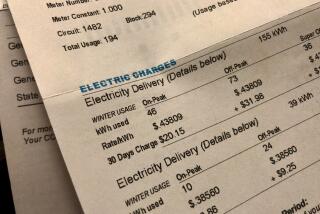Drawing the Line on Refunds
WASHINGTON — Although the harsh rhetoric between California and federal energy regulators has toned down in recent weeks, the two sides remain far apart today on the state’s key demand for reparations for alleged industry abuses during the electricity crisis.
With the release this month of internal Enron Corp. memos detailing trading ploys during the energy crisis, California officials have stepped up their demands for refunds.
The Federal Energy Regulatory Commission “must give Californians their money back, both for past market manipulation in 2000 and 2001 and for excessive long-term contract prices,” said Loretta Lynch, California’s top utilities regulator.
But her counterpart at FERC, commission Chairman Patrick H. Wood III, has reached no such conclusions: “There’s not a lot of remedial authority that we have. Our remedial authority here is much less than any state [utilities commission] has in the country.”
Federal law precludes FERC from ordering any refunds before October 2000, which would put overcharges during the summer of 2000 beyond its reach. That could slash the refund amount the state is requesting, $8.9billion for the period of May 2000 to May 2001.
FERC will determine who will receive any refunds they order, but the money probably would go to Southern California Edison, Pacific Gas & Electric and San Diego Gas & Electric.
The funds eventually could flow to customers who paid higher rates.
In addition to refunds, California is also seeking to renegotiate about $40billion in long-term electricity contracts that it entered into before power prices plunged last summer.
FERC policy discourages undoing contracts entered into by private parties, but a possible compromise may involve shortening the term of the deals by simply allowing them to lapse. The state could then claim a savings.
California officials attacked FERC during the height of the energy crisis, saying it failed to take an aggressive enough posture in fighting alleged market manipulation.
But recent steps by FERC to widen its investigation into possible manipulation have softened the criticism.
Wood, who was appointed to the top FERC post in August, has pleased California officials by declaring that market abuses must be exposed and punished, but he has been very guarded when it comes to what FERC will do in the California case.
The refund and contracts issues are the subject of separate legal proceedings before FERC administrative law judges.
“Did California experience severe electric market problems? Clearly, yes,” Wood said. “Were those problems the result of market manipulation? We are currently investigating that issue.”
Lynch, however, asserts that FERC’s lack of regulation helped spawn the crisis.
“The California energy crisis has never been about ... economic fundamentals. It has been about the complete lack of ... federal regulation,” Lynch said.
But many industry and FERC insiders see no violations of federal laws in the trading practices detailed in Enron memos released this month.
Commodities traders make money by buying goods in a market where the prices are low and selling them in another market where prices are higher. Many of the Enron strategies described in the memos simply built on that theme, while also taking advantage of convoluted market rules in California.
“Are those unfair business practices proscribed by the Federal Power Act? That is not clear,” said Roger Berliner, a veteran Washington energy lawyer who represents Los Angeles County before FERC.
“I don’t believe this is going to be a matter of black-letter law. This is going to be a matter of interpretation and signal sending.” Berliner is working with the county in its support of the state’s refund plea.
Refunds as such might never materialize, said an independent consultant who represents the industry. Instead, the power generators may choose to reduce electricity bills they are still owed by California utilities and the state.
“It is unlikely that at the end of this process anybody will write a check to the state of California,” said the consultant, who asked not to be identified. “The question is, how much will the state of California have to write a check for money that it owes to other people? It’s going to be less than what’s on the books at this moment.”
For the average citizen, there probably isn’t much of a distinction between the two remedies being sought by California: refunds for power already purchased and consumed, and lower prices for power contracted for in the future. Both represent a form of restitution. The bottom line is the same: Californians would save.
At FERC, refunds and renegotiated contracts represent distinctly different legal issues, both thorny.
The same federal law that gives FERC authority to set “just and reasonable” rates for wholesale electricity also restricts its power to order refunds.
FERC’s governing board ruled in July that it had no legal authority to act on a significant portion of Gov. Gray Davis’ refund request. That’s because the law limits the period for which a refund can be required.
California is seeking refunds for the period beginning in May 2000. FERC said it can order refunds only from Oct. 2, 2000, onward--that is, 60 days after a complaint was first filed with FERC, as prescribed in the law.
A precise breakdown of the state’s $8.9-billion demand is not available, but most analysts believe the refund restriction would trim it by several billion.
Wood has asked Congress to change the law to allow refunds for periods exceeding the 60-day limit. “It will increase the deterrent effect [and] it will give customers a stronger incentive to notify the commission immediately when they perceive manipulation,” he told the Senate. It would come too late to help California.
FERC appears to have more maneuvering room on the contracts issue.
The agency’s basic policy is not to interfere with contracts that independent parties already have entered into because government tinkering makes investors skittish.
“The commission’s long-standing policy ... has been to recognize the sanctity of contracts,” FERC’s governing board said in an April decision to investigate the California contracts. “Rarely has the commission deviated from that policy and then only in extreme circumstances.”
However, the board went on to say it would consider nullifying the contracts because of public interest concerns and “unusual circumstances” in California and the West.
FERC Commissioner William Massey, an internal critic whose warnings about California turned out to be prophetic, said the agency should put utility customers ahead of Wall Street investors.
“I understand there is a concern that investigating these contracts may create uncertainty for long-term contracts and investing,” said Massey. “Nevertheless, this commission is simply not meeting its statutory responsibilities if we rubber-stamp contracts.
“It seems obvious to me that the soaring prices in the spot market had a dramatic effect on ... the contracts that were ultimately negotiated,” Massey said. “Certainly no buyer would agree to pay $249 per megawatt-hour if spot market prices and expectations of future spot market prices were not also in that range.”
California power is now trading for about $30 per megawatt-hour.
*
Times staff writer Nancy Rivera Brooks contributed to this report.
More to Read
Inside the business of entertainment
The Wide Shot brings you news, analysis and insights on everything from streaming wars to production — and what it all means for the future.
You may occasionally receive promotional content from the Los Angeles Times.










